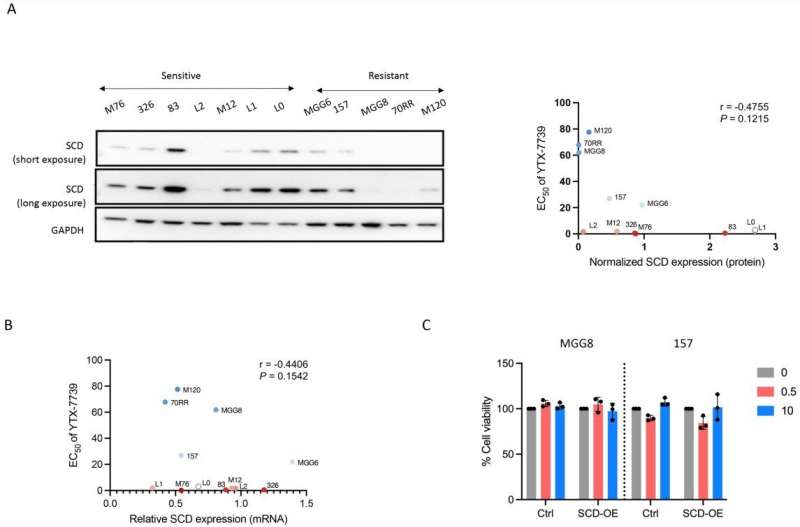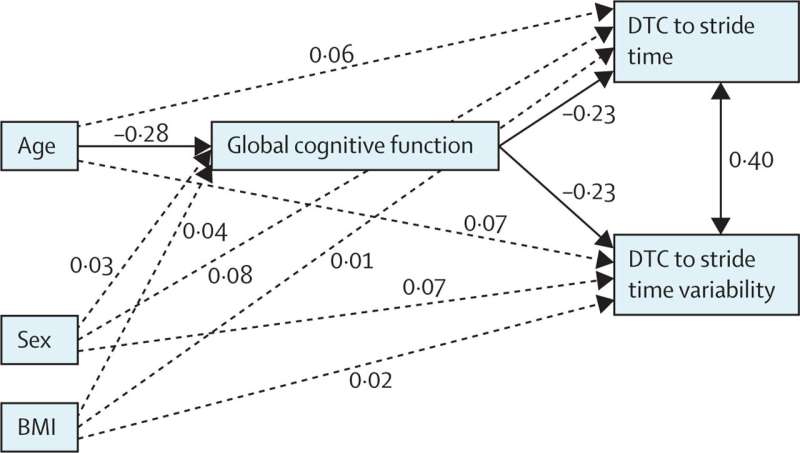
As a result of glioblastoma, a extremely competitive and deadly mind most cancers, is resistant to standard remedies, investigators are on the lookout for traits of glioblastoma cells that might level to promising drug objectives.
One such function is the cells’ reliance on what is referred to as de novo lipid synthesis—or the conversion of carbohydrates to fat—to beef up the cells’ power calls for.
New analysis led via scientists at Massachusetts Basic Sanatorium (MGH) finds {that a} drug that inhibits the enzyme stearoyl CoA Desaturase 1 (SCD) interferes with this procedure, and when administered to mice with glioblastoma, the drug delays tumor enlargement and will increase glioblastoma cells’ sensitivity to anticancer remedies. The findings, that are printed in Science Translational Medication, might result in new remedy choices for sufferers.
Throughout one step of de novo lipid synthesis, SCD converts saturated fatty acids to monounsaturated fatty acids. Up to now, Christian Badr, Ph.D., an assistant in Neuroscience at MGH and an assistant professor of Neurology at Harvard Scientific Faculty, and his colleagues confirmed that glioblastoma cells rely on activation of SCD and the supply of monounsaturated fatty acids.
On this new analysis, the crew examined the anti-glioblastoma doable of an SCD inhibitor, YTX-7739, that may go the blood mind barrier and is being evaluated as an oral drug in section I scientific trials for the remedy of sufferers with Parkinson’s illness.
The investigators discovered that YTX-7739 was once poisonous to patient-derived glioblastoma stem cells. By way of blockading SCD, the cells collected too many saturated fatty acids, a procedure known as lipotoxicity. Additionally, when administered to mice with tumors, YTX-7739 inhibited processes all in favour of fatty acid metabolism in glioblastoma cells and larger the cells’ sensitivity to standard glioblastoma chemotherapy.
When inspecting the detailed mechanisms at the back of YTX-7739’s results on cells, the scientists discovered that the MEK/ERK signaling pathway renders glioblastoma cells in particular at risk of YTX-7739, while the AMPK signaling pathway acts to offer protection to glioblastoma cells and will lead them to immune to the lack of de novo lipid synthesis that happens when YTX-7739 is provide.
“In keeping with our effects, we advise that MEK/ERK and AMPK actions, which can also be detected in tumor biopsies, might be predictive biomarkers to steer affected person variety and stratification,” says Badr.
In different phrases, sufferers whose tumors have tough MEK/ERK task would most likely have the benefit of remedies reminiscent of YTX-7739, while the ones with top AMPK task most likely would now not. “Our findings must additionally lend a hand tailor remedy paradigms to maximise healing efficacy.
For example, some extensively used medication, such because the anti inflammatory agent salicylate or the anti-diabetic compound metformin, are potent activators of AMPK and might be destructive to the efficacy of YTX-7739 or different de novo lipid synthesis–focused on remedies,” says Badr.
Additional information:
Katharina M. Eyme et al, Focused on de novo lipid synthesis induces lipotoxicity and impairs DNA injury restore in glioblastoma mouse fashions, Science Translational Medication (2023). DOI: 10.1126/scitranslmed.abq6288
Quotation:
Investigational drug might strive against mind tumors via focused on most cancers cells’ fats manufacturing (2023, January 19)
retrieved 24 January 2023
from https://medicalxpress.com/information/2023-01-drug-combat-brain-tumors-cancer.html
This record is matter to copyright. Excluding any truthful dealing for the aim of personal find out about or analysis, no
phase is also reproduced with out the written permission. The content material is supplied for info functions handiest.
Supply By way of https://medicalxpress.com/information/2023-01-drug-combat-brain-tumors-cancer.html



